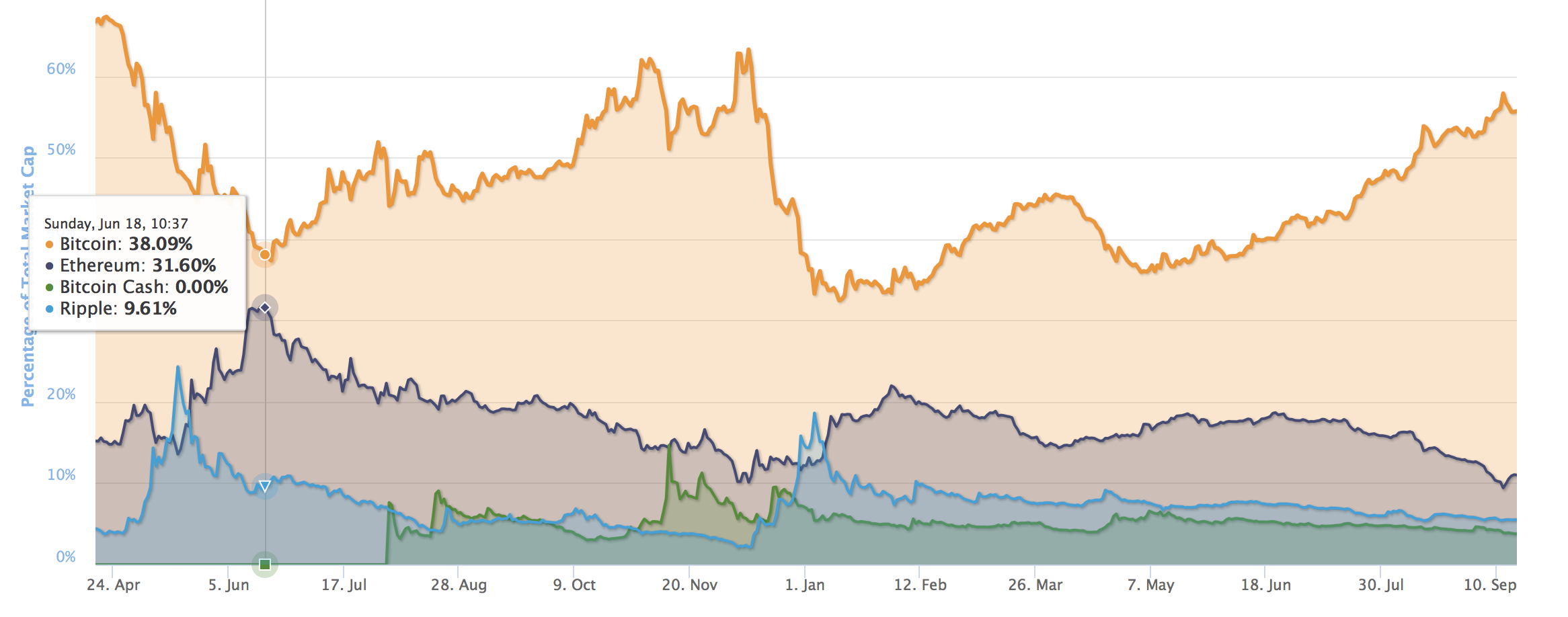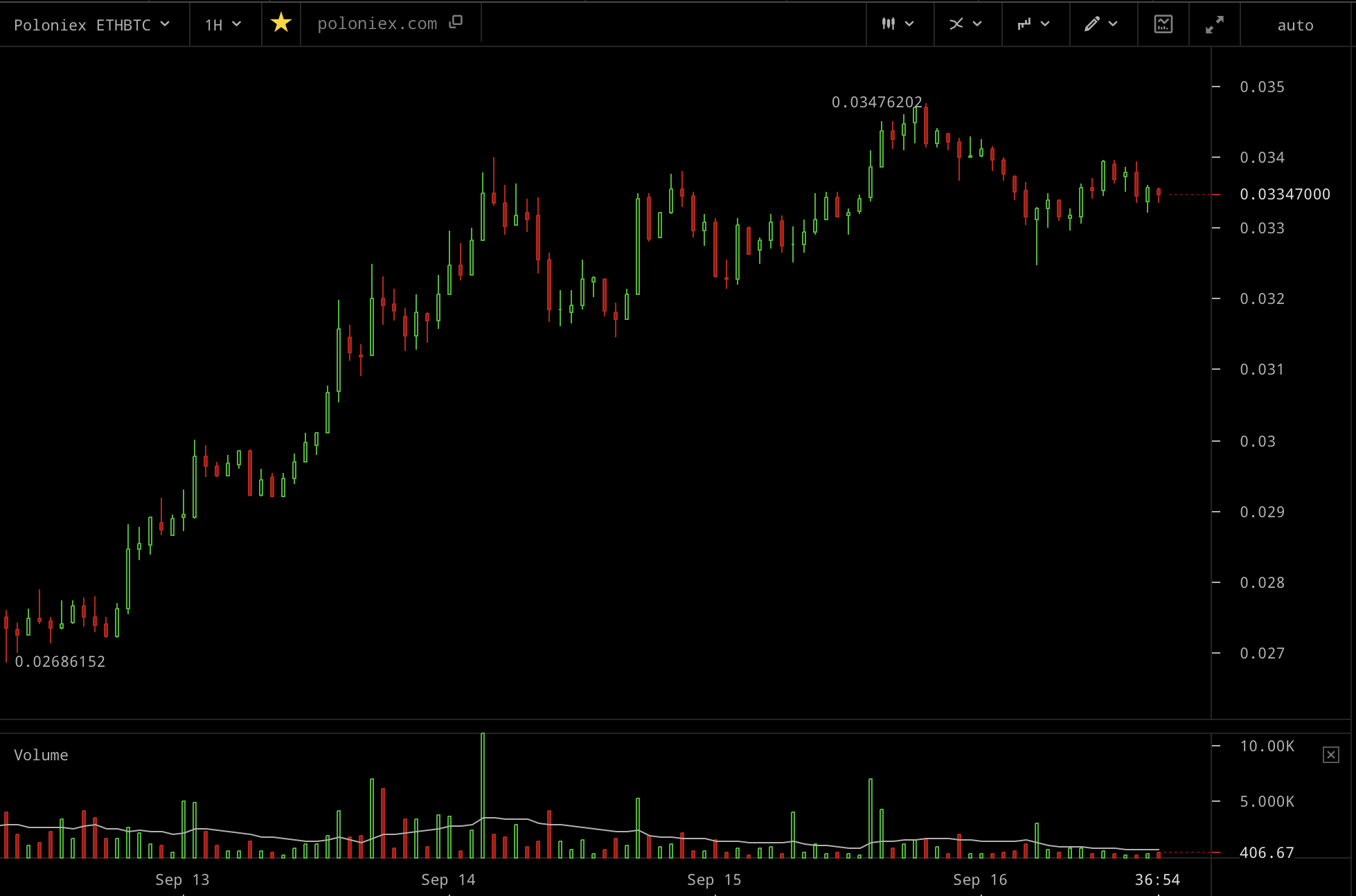Is the Ethereum Flippening Still on the Cards?

Something strange happened earlier today. For a brief few hours, ethereum’s price was up while bitcoin was down, a sight we had not seen in a very long time.
Almost as long as the last time we had heard of the flippening, a term of art used to describe the point ethereum overtakes bitcoin in market cap to become the very top crypto.
Right now, eth has some long way to go to flip. Its price would have to rise to about $1,000, quite a bit more than the current $220. That’s assuming bitcoin doesn’t move at all from its current $111 billion market cap.
But could it happen? It nearly did on June 18th 2017 when ethereum almost overtook bitcoin. Now, however, the gap has widened considerably:

The current gap between bitcoin and eth is in fact near December levels when it was the biggest since bitcoin started losing considerable market share to other cryptos due to its lack of innovation and due to its inability to accommodate further capacity to meet demand.
Yet that has, in part, been counteracted since November 2017 by bitcoin being far better known and in some ways by bitcoin continuing to act as an entry point from fiat to cryptos, especially in non USD markets.
Ethereum in particular has made great strides in establishing its own fiat pipelines for major currencies like the dollar, but for emerging markets and for many other markets, bitcoin remains the only trading pair against a number of national currencies.
Ethereum has further established many trading pairs against other cryptos, but bitcoin does still dominate there. On the other hand, ethereum is building a whole new dapps ecosystem in decentralized exchanges and much else where eth dominates by far.
Finally, bitcoin is trying to push the envelope in accessing more traditional Wall Street markets, with CME/CBOE futures being one of them and the many applications for a bitcoin ETF being another.
Ethereum, however, may well see CBOE futures by the end of the year. While a bitcoin ETF is unlikely to be accepted, and even if it was, an eth ETF and a general cryptos ETF would probably go live within months.
So, with bitcoin now having reached mainstream awareness, and with bitcoin continuing to lack any innovation, continuing to lack any programmable money qualities, continuing to not be a platform and so on, it is unclear what there is to look forward to in the near future as far as bitcoin is concerned except for the halving in 2020.
Ethereum, is to have that halvening within about four-five weeks when new issuance is to be reduced by 33%. In effect, new sell pressure is to be almost halved, and continuously so, which may have a considerable effect.
For example, the last time ethereum’s issuance was reduced by a likewise percentage was in October 2017 when price was at $300. Within weeks it then went on to jump to $1,400.
That period, and much of the period preceding it, shows that while many think bitcoin and eth move in tandem, they in fact have very much a mind of their own.
Bitcoin’s price was rising and rising, for example, between September and early November 2017, while eth stayed flat. Recently, bitcoin has remained flat while eth has been falling and rising, starting to considerably gain against bitcoin in the past week.

As can be seen, ethereum has been gaining against bitcoin for much of this week and that’s presumably because more people have bough eth than bitcoin.
The two, therefore, sometime move in the opposite direction, with ethereum sometime rising while bitcoin falls or stays flat and vice versa.
The question is whether ethereum is about to take the baton in leading the crypto space after bitcoin’s stupendous bull run. Something which eth tried to do in January, but that was more bitcoin dragging eth up, so eth couldn’t carry its own weight and the whole space with it like it did in May 2017.
Since then, ethereum hasn’t seen an “independent” bull run of its own, with eth really being flat in now a year and a half if we ignore the up and down movements in between.
But could the smart contracts platform lead the show again? It has a lot to look forward to. The Constantinople upgrade, Devcon 4, then the Christmas break brings us to 2019 when a panic of sorts should really be setting for dapps coders and coders in more traditional corporations because at that point they would have little time to get their projects out prior to Sharding, Casper and so on.
Once those two upgrades are out, then the game completely changes. That’s because one utterly unique and super important aspect of eth compared to bitcoin is the fact that in ethereum smart contracts can hold funds and can move them only according to coded rules. That is, ethereum is actually programmable money, but it is more than that.
The smart contract is an address, like your own crypto wallet. While your wallet requires a private key to move funds, the smart contract does not require a private key. The private key for the smart contract is the coded rules within the smart contract itself upon which it automatically acts.
This innovative aspect saw a set-back because of the Slockit DAO, but the MakerDAO’s DAI is now cancelling that because their smart contract has been running for months and it hasn’t been hacked.
About $50 million worth of eth currently sits in the DAI smart contract. Every pence of that eth moves in or out based solely on the publicly accessible rules of the contract. One little bug, one oversight, and all that eth could be gone.
Yet, now for months, no one has been able to take them. A fact which, the longer it continues to remain a fact, the more profound it becomes for it proves that ethereum’s primary proposition actually work.
And what is ethereum’s primary proposition? Subjectivity here may give you your own opinion, but imagine if we replace all these SEC or regulatory rules with smart contract code that says if this then that.
Like Digix recently held a vote on whether they can spend 70,000 eth. The vote, in a way, was for show. Digix Global has full control and ownership of the eth. If the vote had gone no, then there would have been nothing to stop them from spending the 70,000 eth anyway.
If the funds had instead been held by the smart contract with coded rules to dictate the conditions upon which funds can move, then the matter may have been very different as investors could have said no without any fear of them being ignored and the funds used anyway. That is, without any fear they caused unnecessary trouble.
That current disbalance between projects that have already raised funds and their investors therefore could easily be addressed by coded “contractual” rules which can not be breached. Something which in effect would make SEC irrelevant regardless of whatever SEC may say.
That in fact was the initial promise of ICOs, new entities where the many investors pool their funds under open public unbreachable rules, but the SlockitDAO hack shelved that idea because it made everyone scared of putting their funds in a smart contract.
Now, DAI is showing that funds controlled by smart contracts can be very safe, and with that they are in effect proving ethereum’s proposition.
A proposition which goes far beyond ICOs to machines or robots or inanimate matter, like a fridge, having a bank account with the code determining how the machine can move these funds, for what reasons, and under what conditions.
Funds which of course can be hacked if the coder is sloppy because these funds would not depend on external access like a private key, but only on the smart contract coded rules, so if those rules have a loophole then the funds can be gone.
Yet as long as DAI moves, such hack would be due to the incompetence of the coder who should go back to school. Proper coders, and proper projects, would be unaffected for we are learning there is such a thing as unhackable code.
From there, the opportunities are endless, the possibilities far too many. The automation, the new methods of organization, the room for innovation. A completely new world.
Copyrights Trustnodes.com














Article comments